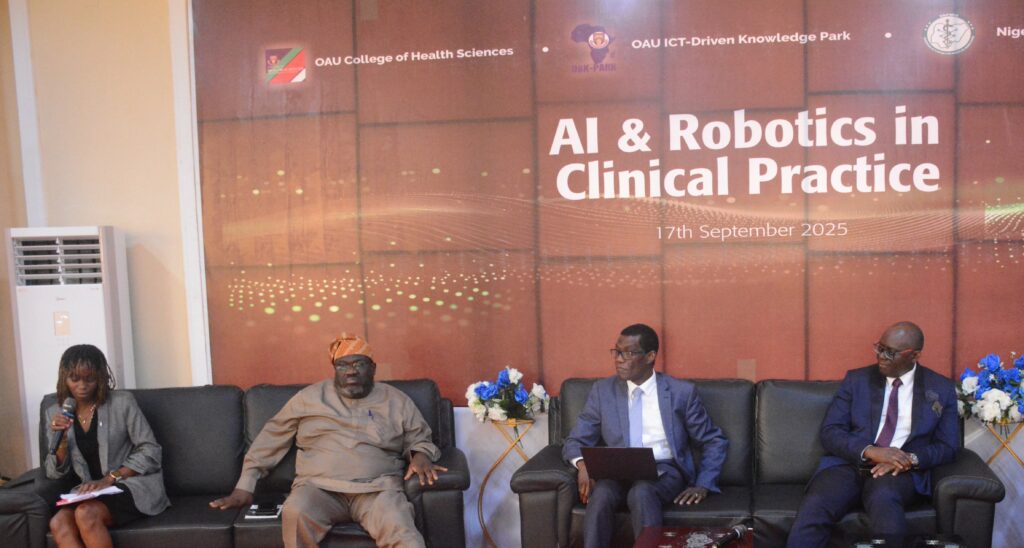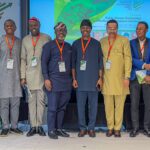
L- R: Dr Aderonke Lawal, Panel Moderator, Nigeria AI Forum for Medical Directors (NAIFMED) Roundtable; Mr Ejovi Aror, Group Managing Director, ipNX Nigeria Limited; Professor Philip Oguntona, Associate Dean, School of Computing and Information Technology, University of Wollongong, Australia; and Professor Oluwasegun Alatisegun, Surgeon, Department of Surgery, Obafemi Awolowo University at the inaugural Nigeria AI Forum for Medical Directors, which held at OAU ICT-Driven Knowledge Park, Ile-Ife on Wednesday, September 17, 2025.
The Nigerian medical industry requires a reliable backbone infrastructure to successfully adopt Artificial Intelligence (AI) in clinical practice—without the need for importing foreign talent. This was the submission of Mr. Ejovi Aror, Group Managing Director of ipNX Nigeria, at the inaugural Nigeria AI Forum for Medical Directors (NAIFMED) Workshop, hosted by the Obafemi Awolowo University (OAU) ICT-Driven Knowledge Park on Wednesday, September 17.
Themed “Transforming Healthcare: AI-Driven Solutions for Nigeria’s Medical Future”, the event brought together top clinicians, medical researchers, directors from Nigeria’s tertiary health institutions, speakers from across Africa, as well as practitioners, stakeholders, and ICT industry players. The workshop also witnessed the induction of the Nigerian Healthcare AI Implementation Special Aid Group (NHAISIG).
Speaking alongside thought leaders in medical AI research; Professor Olusegun Alatisegun of OAU and Professor Philip Ogunbona from the University of Wollongong, Australia, Mr Aror on a panel titled “AI and Robotics in Clinical Practice”, drew parallels between the current opportunities for AI in medicine and the early days of the Nigerian banking industry, particularly the creation of the Nigeria Inter-Bank Settlement System (NIBSS).
“There was no infrastructure when we began building NIBSS, but we crafted solutions to address the challenge. I am confident we can do the same for AI adoption in medical practice in Nigeria. Fortunately, on the network side, we already have significant infrastructure. The more complex computing challenges can be solved, just as we did before. The Nigerian ICT sector is resilient—we can build the support structure our nation needs,” he stated.
Aror stressed that reliable backbone infrastructure is the foundation for digital healthcare transformation:
“We have interconnections between banks, NIBSS, and the Central Bank of Nigeria (CBN) that are extremely reliable. Even though transfers from phones may occasionally face technical issues, the backbone itself is solid. That reliability is what makes the system work—and the same is what we must achieve in healthcare. Importantly, Nigeria has the talent to build and maintain this backbone, just as we did for financial services.”
He further emphasized that Nigeria must adopt a deliberate, coordinated national strategy to guide AI adoption in healthcare. Such a framework, he noted, should set standards for data governance, ethics, and infrastructure development.
“This is bigger than government or any one company—it requires a coalition: government, academia, hospitals, telcos/ISPs, regulators, and innovators. At ipNX, we recognised this early. For instance, we supported the creation of an AI Studio at Obafemi Awolowo University because we understand it is not just about building networks but fostering environments where research and innovation can flourish.”
With the right infrastructure, Nigeria’s medical industry can leverage AI to deliver improved patient outcomes, enhance clinical efficiency, and transform healthcare delivery across the country.



